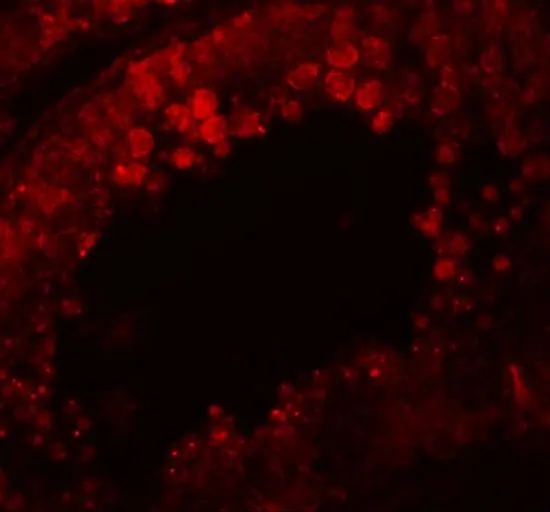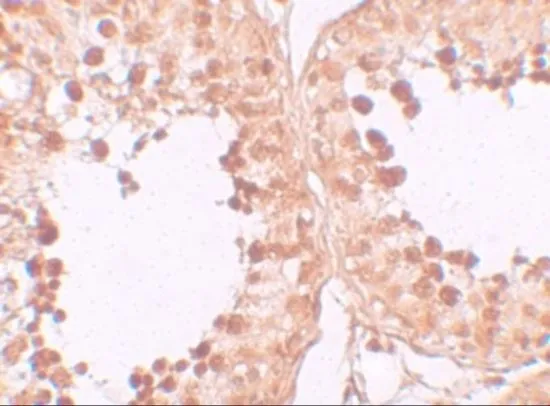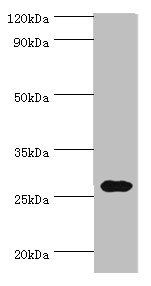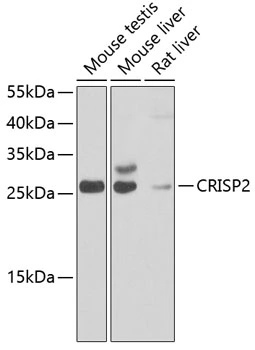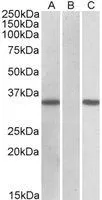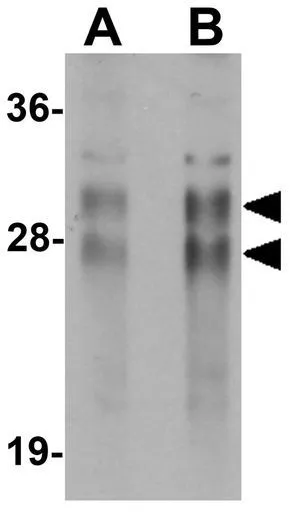
WB analysis of human testis tissue lysate using GTX85002 CRISP2 antibody. Working concentration : (A) 0.5 and (B) 1 μg/ml
CRISP2 antibody
GTX85002
ApplicationsWestern Blot, ELISA, ImmunoHistoChemistry, ImmunoHistoChemistry Paraffin
Product group Antibodies
ReactivityHuman
TargetCRISP2
Overview
- SupplierGeneTex
- Product NameCRISP2 antibody
- Delivery Days Customer9
- Application Supplier NoteWB: 0.5 - 1 microg/mL. IHC-P: 10 microg/mL. *Optimal dilutions/concentrations should be determined by the researcher.Not tested in other applications.
- ApplicationsWestern Blot, ELISA, ImmunoHistoChemistry, ImmunoHistoChemistry Paraffin
- CertificationResearch Use Only
- ClonalityPolyclonal
- Concentration1 mg/ml
- ConjugateUnconjugated
- Gene ID7180
- Target nameCRISP2
- Target descriptioncysteine rich secretory protein 2
- Target synonymsCRISP-2, CT36, GAPDL5, TPX1, TSP1, cysteine-rich secretory protein 2, cancer/testis antigen 36, glyceraldehyde-3-phosphate dehydrogenase-like 5, testicular tissue protein Li 43, testis specific protein 1 (probe H4-1 p3-1), testis-specific protein TPX-1
- HostRabbit
- IsotypeIgG
- Protein IDP16562
- Protein NameCysteine-rich secretory protein 2
- Scientific DescriptionThe cysteine-rich secretory proteins (CRISP) family is a group of four proteins that are strongly expressed in the male reproductive tract and have been implicated in having roles in male fertility. CRISP2, also known as TPX1, has been implicated in the adhesion between spermatids and Sertoli cells, and with CRISP1, is thought to be involved in sperm-egg fusion. CRISP2 has been shown to regulate the Ca2+ influx through ryanodine receptors (RYR) and may influence the acrosome reaction or sperm motility. CRISP2 has also been shown to bind to the mitogen-activated protein kinase kinase kinase 11 (MAP3K11) and localizes to the developing acrosome, suggesting this CRISP2-MAP3K11 complex may have a role in acrosome development.
- ReactivityHuman
- Storage Instruction-20°C or -80°C,2°C to 8°C
- UNSPSC41116161

